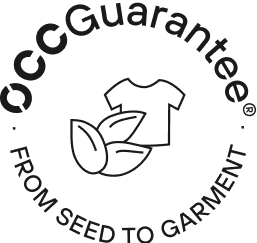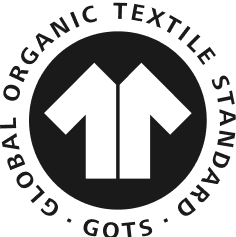Our story and vision
We are pioneers in offering cotton products that care for the health of people and the planet.
Organic Cotton Colours was founded in 1992 to create undyed garments made from 100% organic cotton, originating from cotton varieties that naturally grow in cream, green, and brown shades. These garments, made of pure cotton without harmful chemical residues, are extremely soft for people's skin and enhance the lives of individuals with atopic skin and various dermatological sensitivities.
What started as a project for people’s health has, 30 years later, transformed into a more holistic and ambitious vision: to generate a positive impact on people and the environment, contributing to transforming the current conventional textile industry— one of the most polluting, unsustainable, and socioeconomically unfair industries on our planet.
We produce fabrics and clothing from pure cotton sourced from 100% organic crops, ensuring it is free from harmful chemicals, without engaging in wet processes and dyeing methods that involve toxic products. We source cotton from projects that practice regenerative agriculture and that promote the fair development of agricultural communities. We transform our cotton into yarns, fabrics and garments working with suppliers who follow sustainable industrial processes. In the search for the purest cotton and fabrics, we became aware of the urgent need to transform the conventional cotton industry worldwide.
We aim to generate a positive impact and contribute to changing the current model of the textile industry, from seed to the final garment. We believe we can achieve this by promoting 100% Organic Cotton grown using Regenerative or Biodynamic agricultural techniques and working exclusively with fibre transformation companies that share our vision and commitment to using sustainable and ethical processes.
We are determined to always offer the best cotton for people and the planet, from seed to garment.
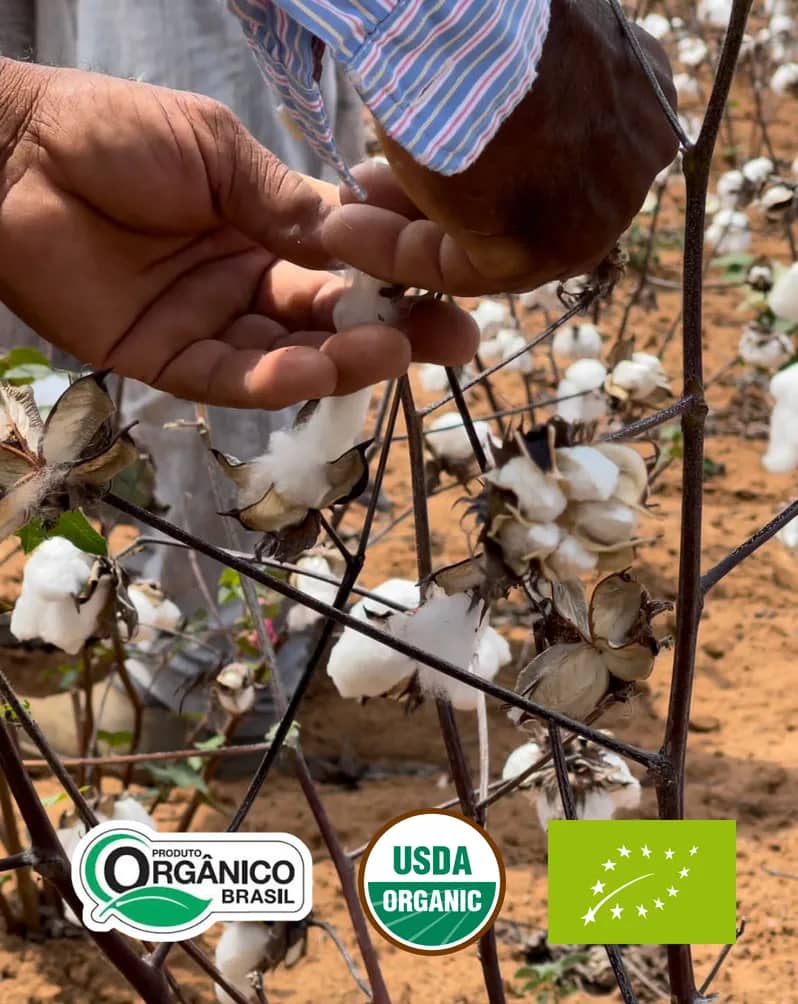
Organic
The method of organic cultivation is carried out using agricultural practices with no genetically modified seeds, synthetic pesticides, herbicides, or chemical fertilizers. Organic practices often go beyond avoiding only genetically modified seeds and synthetic inputs; they typically include a holistic approach that emphasizes soil health, biodiversity, and animal welfare.
Cotton obtained from organic farming is not only harmless to the health of people involved in its cultivation, handling, and wearing but also of better quality. The absence of chemicals in its growth process allows for purer, longer, softer, and more resilient fibres.
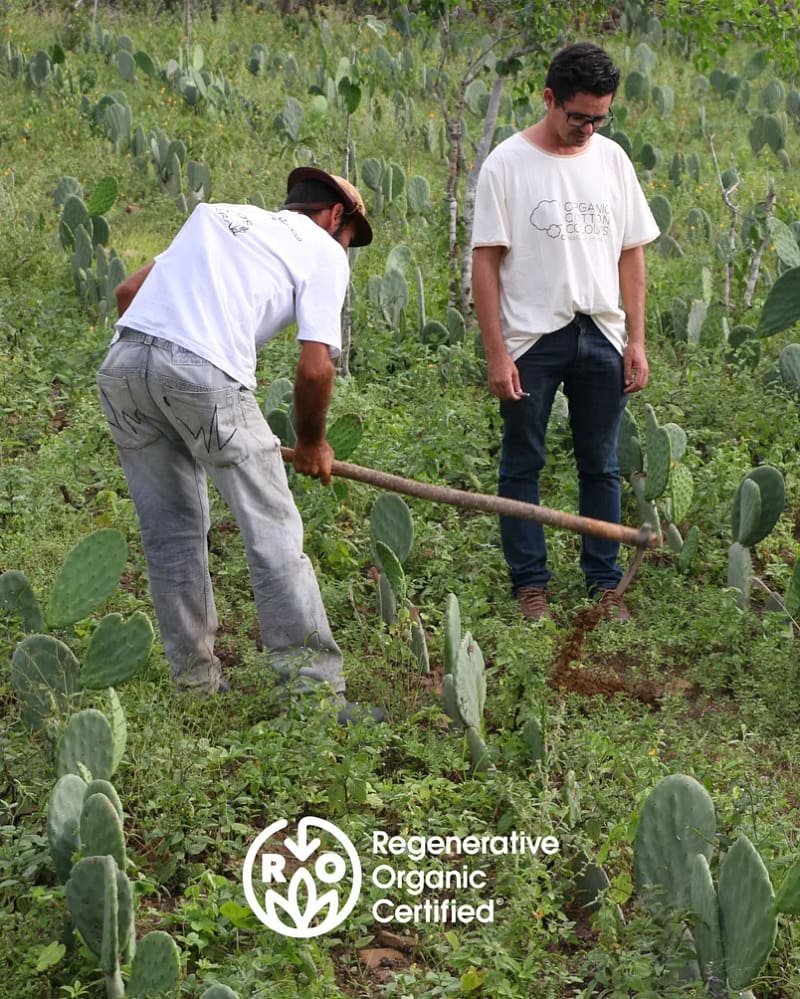
Regenerative
The regenerative cultivation method encompasses the essence of organic farming but additionally adopts an ecosystemic approach: it is based on the restoration and improvement of agricultural ecosystems, including soil nutrient replenishment, preservation of healthy water resources, and enhancement of biodiversity. The primary goal is to restore the balance of ecosystems to ensure their regeneration and sustainability.
Regenerative cotton combines organic farming techniques with methods such as mulching, crop rotation, and intercropping. Regenerative practices maximize the potential of agriculture to capture and store large amounts of carbon in the soil and plants, contributing to reversing climate change. Furthermore, it considers the needs and rights of agricultural communities, improves their living conditions, and ensures a fair and sustainable agricultural system.
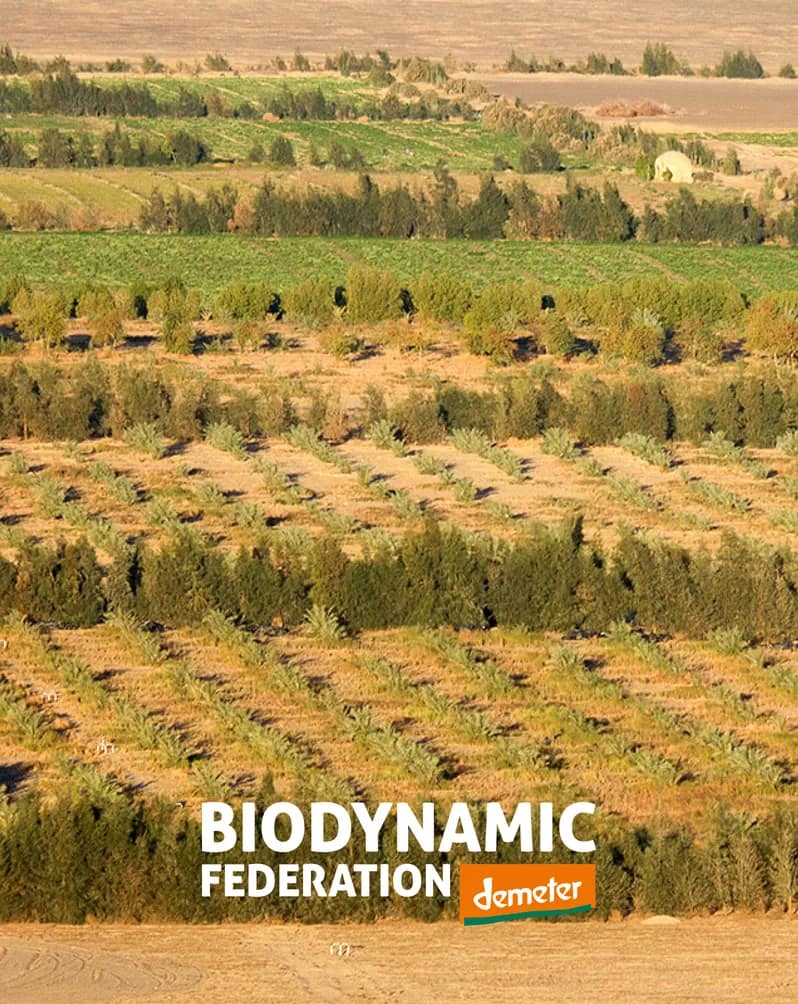
Biodynamic
The biodynamic cultivation method includes organic and regenerative farming, but is based on the principles of anthroposophy, a spiritual philosophy developed by Rudolf Steiner. Anthroposophy asserts that astrological and cosmic influences impact agriculture and aims to harmonize them with agricultural activities.
This methodology involves working with special preparations made from natural substances such as medicinal plants and minerals, which have beneficial effects on agriculture and the health of living beings. It follows a calendar that considers the movements of the Moon and other celestial bodies to determine the best times for agricultural tasks, such as planting, pruning, and harvesting. In its practice, the goal is to promote balance among various elements of the agroecosystem, including crops, animals, soil, and humans, to enhance sustainability and soil fertility.
Explore how we work
Finest organic and regenerative cottons that benefit and improve the world
Environmental
Eliminating the use of chemical products, preserving the quality of the soil, water, and biodiversity optimizes soil fertility. Carbon capture reduces CO2 emissions, helping to conserve natural resources and mitigate climate change.
Social
Supporting sustainable and fair agriculture provides opportunities for work and local development. It promotes the resilience and self-sufficiency of farmers, fostering food security and economic diversification.
Health
Avoiding the use of chemical
products is crucial for protecting the health of farmers and the planet. Crafting cotton fabrics free from toxic substances ensures soft and hypoallergenic materials, perfect for
creating healthy and comfortable
clothing for the skin.
Quality
Various studies demonstrate that fibres growing stronger, longer, and purer, which allow the production of softer, more resistant, and hypoallergenic cotton, come from 100% organic cultivation.
1992
Ángel Fernández establishes Organic Cotton Colours Ltd. to manufacture clothing made from Naturally Colorgrown from the seed organic cotton, for individuals with various skin conditions and sensitivities. He sources cotton from Sally Fox in the United States, produces the yarn in Barcelona, and manufactures fabrics and garments in Portugal.
1993
Organic Cotton Colours Ltd. pioneers the commercialization of 100% organic cotton clothing in Spain, launching its first collection of naturally coloured cotton garments under the brand Fox Fibre.
1995-2009
Fox Fibre expands and opens more than 10 franchises in Europe.
2009
Santi Mallorquí creates the brand Coliflower to promote eco-trends through clothing produced by Organic Cotton Colours Ltd.
2011
Santi Mallorquí acquires Organic Cotton Colours Ltd. and adopts the company’s name as a commercial brand: Organic Cotton Colours Natural Thinking is born, replacing Fox Fibre.
2011
The showroom and warehouse in Sta. Cristina d’Aro are inaugurated. First trip to India in search of our own Naturally Colorgrown from the seed organic cotton.
2012
A dedicated structure is established in Portugal to improve the manufacturing process of Organic Cotton Colours’ fabrics and garments.
2012
Attendance at the first international fair, Biofach in Nuremberg, to present the Organic Cotton Colours brand.
2013
Discovery in the northeast of Brazil of a sustainable and socially fair agricultural project that grows naturally coloured cotton. OCC Guarantee is born, our social project for cultivating our own Naturally Colorgrown cotton, using 100% organic and regenerative agricultural practices.
2013
The company begins diversification into the B2B market, manufacturing and commercializing Naturally Colorgrown cotton fabrics by the meter, and providing clothing design and manufacturing services for third-party brands.
2014
First acquisition of 100% certified organic cotton from the EGE Organics project in Turkey. Organic Cotton Colours Ltd. Obtains the GOTS certification.
2015
First export of cotton from Brazil to Barcelona to spin our own naturally coloured organic cotton yarns. Organic Cotton Colours Ltd. Becomes a member of Textile Exchange.
2021
Organic Cotton Colours Ltd. becomes a B Corp. The following year, we receive the B Corp award, recognizing us as part of the top 5% of the world’s best companies in the Environmental category.
2023
Agreement with SEKEM to represent and commercialize their organic and biodynamic Egyptian cotton Giza. Agreement with EGE ORGANICS to acquire Turkish Aegean cotton from their new organic and regenerative cultivation project.
2024
Obtaining USDA Organic and Produto Orgânico Brasil organic certifications for our naturally coloured Brazilian cotton. Obtaining the regenerative ROA certification for Turkish Aegean cotton. OCC obtains the Demeter certification to market biodynamic Egyptian cotton.
2025
Obtaining the regenerative ROA certification for our naturally coloured Brazilian cotton.
Organic Cotton Colours Certifications
We are very proud to be a BCorp company since 2022, a certification standard that represents the most advanced and rigorous model for sustainable and regenerative businesses in the world. Since 2014, we have been GOTS certified (CU 832882) for all fabric and garment transformation processes. We have been a part of Textile Exchange since 2015, one of the most important non-profit organizations in the sustainable fibres and textiles industry. Since 2023, we have Demeter certification, accrediting us as a distributor of biodynamic origin cotton.





Brands with our soul







